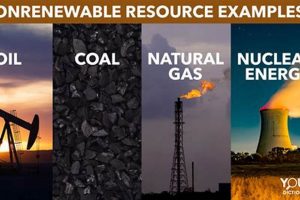
The question of whether biomass derived from trees can be considered a sustainable power resource hinges on its ability to regenerate within a reasonable timeframe. This form of energy relies on organic... Read more »

Globally, a specific form of sustainable power generation outpaces all others in terms of total installed capacity and electricity production. This dominance reflects factors such as technological maturity, established infrastructure, and comparatively... Read more »

Resources that naturally replenish on a human timescale are considered a crucial component of a sustainable energy future. These encompass a variety of methods for generating power, including harnessing the sun’s radiation,... Read more »

Naturally replenishing energy resources, derived from processes that are virtually inexhaustible, constitute a critical component of modern energy systems. Examples include solar radiation, wind, geothermal heat, and water currents. These resources stand... Read more »

A novel resource capable of providing power constitutes an innovation within the energy sector. Such resources represent alternatives to conventional fuels like coal, oil, and natural gas. An illustration would be harnessing... Read more »

Compressed Natural Gas (CNG) is natural gas that has been compressed to less than 1% of its volume at standard atmospheric pressure. Primarily composed of methane, its use is often promoted as... Read more »

Identifying the energy generation method with the lowest overall demand involves analyzing global energy consumption data across various categories. This includes resources like solar, wind, hydroelectric, nuclear, natural gas, coal, and less... Read more »

Resources classified as finite and unable to replenish at a rate that keeps pace with consumption are termed non-renewable energy sources. Fossil fuels, such as coal, petroleum, and natural gas, exemplify this... Read more »

Hydroelectric power, derived from the energy of moving water, currently constitutes the largest share of global renewable electricity generation. This method harnesses the potential and kinetic energy of water, typically through dams... Read more »

Coal is categorized as a nonrenewable energy source because its formation takes millions of years. Organic matter, primarily plants, accumulates in swamps and bogs. Over time, this matter is buried under layers... Read more »


